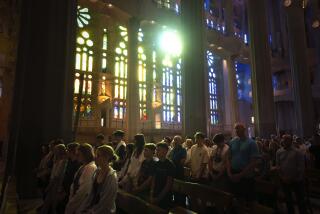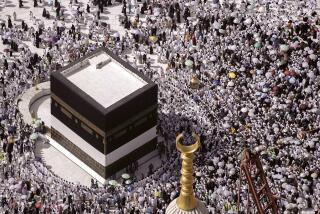Promise of Mosque Unfulfilled in Athens
- Share via
ATHENS — Muslims in the Greek capital can pray in a small room at a crowded cultural center, wedged between a clinic and a schoolroom, or in one of several makeshift basement venues.
But government promises to build an official mosque for the city’s growing Islamic community remain unfulfilled, sidelined by opposition from the powerful Christian Orthodox Church and a small group of neighborhood activists.
“There is no proper place for us to go and pray,” said Abu Yassin, an electrician who moved to Greece from the Gaza Strip 20 years ago. “There are thousands of Muslims here, and we don’t have a place to gather.”
On this score, Athens stands alone: It is the only European Union capital without an official mosque.
In fact, none has existed here for nearly 200 years, following the end of four centuries of Muslim Ottoman rule. Greeks’ antipathy toward their historic Turkish enemy has sometimes colored the way in which Muslims are viewed, analysts and human rights advocates say.
To allay that impression and showcase Greek tolerance just in time for this summer’s Olympic Games in Athens, the government of former Prime Minister Costas Simitis announced the construction of an enormous mosque and Islamic educational center, financed by Saudi Arabia and scheduled to go up on an eight-acre plot of suburban land.
Nearly a year after the announcement, however, nary a brick has been laid.
Outraged residents of Peania, the chosen suburb, challenged the government plan in court. They were not being racist, they said, it’s just that there are no Muslims in the area 12 miles northeast of downtown Athens, so why give them a house of worship there?
The Orthodox Church, which counts as its members an estimated 97% of Greece’s 10 million native-born citizens, also objected to the location. Peania lies near Athens’ brand-new international airport, meaning travelers arriving on airplanes would easily glimpse a towering minaret.
“Does the first image of Greece a foreigner sees have to be a Muslim mosque?” asked the church’s spokesman, Father Epifanios Economou.
Church leaders insist that they do not object to the building of a mosque in principle.
Several Muslims and their advocates also have a problem with the Peania location, noting that it could take worshipers hours to get there.
Abu Yassin, who asked that his full name not be published, usually prays at the Arab-Hellenic Center for Culture and Civilization, a two-story walk-up near downtown. It is not a mosque, but Muslims crowd into the upper floor on Fridays -- the overflow sometimes running down the stairs and onto the street -- for prayers led by an unofficial imam.
The center also provides medical services, computer lessons and child care.
For at least a decade, Abu Yassin said, he’s heard Greek governments float the idea of building an official mosque. He thought that the Olympics would finally provide the incentive for getting it done.
“The Olympics are almost here,” he said, “and nothing.”
Greece has about 130,000 Muslim residents, according to spokesmen for the community, with the majority living in the north, where there are mosques. But thousands of Muslims have moved into Athens in recent years as part of a wave of economic immigration into the eastern flanks of the European Union.
Muslims in Greece are a polyglot bunch, from Albania, Pakistan, Sudan, Lebanon and numerous other nations. Many work in construction and are much in demand these days because of the boom in building ahead of the Olympics.
That boom, for now, doesn’t include a mosque.
Gregory Vallianatos, an activist with the Greek Helsinki Monitor human rights organization, said he had doubts the mosque would become a reality because of festering hostility and suspicion toward Muslims.
“Homogeneity is adored in this country,” he said.
Government officials disagreed. Tassos Yiannitsis, until recently foreign minister, said the “political decision” to give Muslims a proper place of worship was firm and unshakable and that the Greek government was committed to creating an “inclusive, integrated society.” But, he added, it will take time.
“We know people here have a need,” Yiannitsis said in an interview. “But we need a solution that doesn’t create tensions.”
More to Read
Sign up for Essential California
The most important California stories and recommendations in your inbox every morning.
You may occasionally receive promotional content from the Los Angeles Times.














